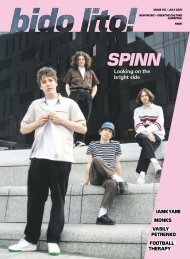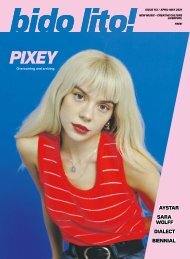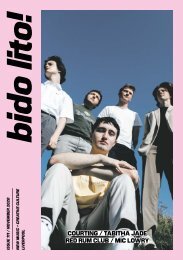Bido Lito June 2021 Issue 114
June 2021 issue of Bido Lito! magazine. Featuring: PODGE, THE CORAL, CRAWLERS, RON'S PLACE, KATY J PEARSON, SEAGOTH, MONDO TRASHO, LIVERPOOL BIENNIAL AND MUCH MORE.
June 2021 issue of Bido Lito! magazine. Featuring: PODGE, THE CORAL, CRAWLERS, RON'S PLACE, KATY J PEARSON, SEAGOTH, MONDO TRASHO, LIVERPOOL BIENNIAL AND MUCH MORE.
You also want an ePaper? Increase the reach of your titles
YUMPU automatically turns print PDFs into web optimized ePapers that Google loves.
THE<br />
CORAL<br />
On their 10th album, The Coral have never sounded so timeless – quite literally –<br />
as they bottle the spectres from a world of sticky clock hands and fading lights.<br />
In one regard, the new album by THE CORAL is very<br />
much them all over. Shiny toe-tappers threaded with<br />
the more complex. The familiar Liverpool scally pop<br />
and Welsh psychedelic hybrid bonds are ever true.<br />
But with Coral Island we see further ambition not merely<br />
as a masterclass in musical and creative world-building,<br />
but in real terms. James Skelly sets out his targets<br />
humbly but with good humour during the second time<br />
we speak. “If you can break back into the top 10 in the<br />
UK charts on your 10th album – a concept album about a<br />
mythical seaside town with your grandad in it – it will be<br />
our biggest achievement since we got our number one.”<br />
He chuckles as he speaks, but it’s an accurate analysis<br />
of both album and scenario. Second album Magic And<br />
Medicine hit the top of the album chart back in 2003 and<br />
18 years is a long time in rock ’n’ roll.<br />
Coral Island waltzes us into a magical place of<br />
unspoken questions, reflecting on the<br />
faded glamour and unsettling nature<br />
of the fairground, the sounds, motion<br />
and people encountered. The album<br />
and accompanying book Over Coral<br />
Island, the latter written by keyboard<br />
player Nick Power, recalls the band’s<br />
childhood summer trips across Wales<br />
and the North West. Wirral’s very<br />
own seaside town, New Brighton,<br />
feels the ideal place to meet James<br />
and Nick to talk about their hopes<br />
for the record. We rendezvous on a<br />
stretch of flat grey concrete yards<br />
from the seafront. Paper cups of tea<br />
and coffee in the open air is quite the<br />
thing now, but undeniably it has an<br />
echo of bygone times and black and<br />
white photographs in family albums.<br />
Any artist’s 10th long-player is a milestone, we<br />
each agree, although the two men seem uneasy at<br />
being described as indie veterans, a term popping<br />
up in reviews with frequency. This point in time feels<br />
significant, not make-or-break exactly, but optimism in<br />
our conversation is offset by frustrations at the music<br />
industry, and personal regrets.<br />
The first section of the album, a soundtrack to the<br />
rides and arcades of summer fairground childhoods, is<br />
bathed in a brittle sunshine not unlike that in which we<br />
squint at each other on this Tuesday morning. Part one<br />
encompasses an idealistic memory, one maybe never<br />
really lived at all, James and Nick tell me. The sadness<br />
of nostalgia and a time gone by start to sink in further<br />
as the record progresses, and we are introduced to the<br />
curious characters living in society’s shadows.<br />
After an hour of talking, we go our separate ways;<br />
James and Nick to carry on with further promotion.<br />
This album is grabbing more attention from journalists<br />
than anything they’ve done for a while. During our<br />
conversation we’d talked about the role post-Elvis,<br />
pre-Beatles rock ’n’ roll and pop played in Coral Island’s<br />
formation. A strange yet fruitful few years of death<br />
ballads and vengeful love songs, giving a voice to the<br />
deep emotional intensity of the emerging teenage<br />
experience and identity. Coral Island’s songs are short,<br />
in keeping with pop conventions of that period. And<br />
what an absolute pleasure it is to hear and feel the<br />
influence of eternal broken-hearted outcast on the run<br />
Del Shannon. This led to playing some of his records at<br />
home afterwards and unearthing a memory of riding the<br />
Waltzer in Southport with his classic Runaway ringing<br />
in ears.<br />
Within days, all the audio from our interview has<br />
vanished, so we find ourselves having to talk again<br />
two weeks<br />
later, a surreal<br />
experience<br />
in itself. Nick<br />
“Coral Island was<br />
more this strange<br />
place just floating in<br />
the sea of your mind.<br />
Almost a metaphor<br />
for your imagination”<br />
is the first to<br />
retrace his<br />
steps. It seems<br />
appropriate<br />
to share the<br />
Del Shannon<br />
in Southport<br />
theory.<br />
“I think<br />
they’re still<br />
playing it now!<br />
You have to play<br />
pre-Beatles rock<br />
’n’ roll spooky<br />
death ditties<br />
with a little bit of Pink Floyd thrown in, and The Doors<br />
every now and then, some 80s, but go back to Gene<br />
Vincent and Wanda Jackson. It’s brilliant!” Nick laughs. “I<br />
think it’s an unwritten code fairgrounds stick to.”<br />
Why does he think that is?<br />
“They’re marginalised places, aren’t they?<br />
Totally off the map, never written about any more in<br />
mainstream culture. It’s outsider music. That’s what we<br />
tried to get across, another world in the real world. An<br />
unreality in reality.”<br />
Nick talks about The Dips in New Brighton, the green<br />
space used by families, and for performance or anti-social<br />
behavior depending on what time of day or year. How the<br />
fair sets up there, a sudden pop-up town. In the eve it’s<br />
kite-flying and dog walkers, the next morn dodgems blast<br />
out Roy Orbison and The Shangri-Las’ drama.<br />
“You might see a poster in a few closed down shops<br />
or chippys,” he says of the fair. “How did they get in?<br />
FEATURE<br />
How did that poster get in there? That shop hasn’t been<br />
open for years. Then you’ll see it – bang – and the next<br />
night it’s gone. Magic.”<br />
Coral Island morphed into a double album as the<br />
band worked on it, he explains, expanded by James<br />
and Ian Skelly’s grandfather Ian Murray in the character<br />
of The Great Muriarty narrating between songs. It’s<br />
difficult to recall many contemporary double albums in<br />
the independent music arena, so Coral Island is either an<br />
anomaly, or maybe we simply make more space and time<br />
for things now. The album does play around with past<br />
and present and it’s true that, when we’re kids, summer<br />
holidays last forever, while cold hard adult reality<br />
confirms a fixed six-week length.<br />
“There’s a bit in the book about that, your experience<br />
of time, it massively changes as you get older,” says Nick.<br />
“Small things when you’re a kid seem mind-blowing.<br />
You’re in the present, totally rooted in the now. When<br />
you get older you live in the past or future a bit more,<br />
memories or anticipating.”<br />
Nailing down radio-friendly singles Faceless Angel,<br />
Lover Undiscovered, and Vacancy gave licence to sail<br />
into deeper, darker waters. Coral Island was created<br />
with a 1960s approach, writing and recording quickly<br />
while everything was still fresh. “This album was kinda<br />
like, let’s go for broke. Make something which the record<br />
company might advise against! If we can get the money<br />
for it, let’s just do what we want,” Nick explains.<br />
There is a strong narrative present, not only due<br />
to the spoken word, but noticeably so within the<br />
songwriting itself. The listener, and presumably the<br />
creators, go on a journey along with it?<br />
“It goes back to folk tales and things like that, or<br />
murder ballads or weird character studies. I love songs<br />
that tell a story, a lot of the ones we drew from for this<br />
album are like that, tell a story – mostly about people<br />
dying,” Nick laughs. “But as you said last time, it was<br />
early goth!”<br />
“There’s a lot in there, we very rarely just tell a<br />
straight story,” James Skelly explains, when we pick<br />
things up. He resists temptation to write literally, leaving<br />
enough suggestion for people to project their own<br />
stories. “The version in your head is always going to be<br />
better because you’ve made it for you.”<br />
The Great Muriarty, then, could be the ringmaster<br />
of the big top, or delivering Roald Dahl’s quite terrifying<br />
scenarios in the old Tales Of The Unexpected series.<br />
Sinister and not ghostlike exactly, but from behind an<br />
invisible veil.<br />
“That doesn’t exist anymore, the world he’s<br />
from, that generation,” says James of his story-teller<br />
grandfather who took him camping as a boy – these<br />
memories feeding into the record. “So, he’s actually, in<br />
a way, a time traveller. Like he’s going back to an older<br />
19

















